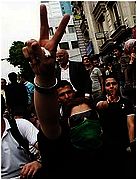Mobilization of Mosques to Confront the Greens
» Special Confidential Directive:
As the holy month of Moharram approaches, various agencies of the Islamic republic are preparing themselves for a special commemorative event. In this light, the head of the mosques organization revealed the issuance of a special directive to Iran’s mosques across the country to explain the various aspects of what the leaders of the Islamic republic call “the sedition events of 2009.”
According to semi-official Fars news agency while announcing this news, hojjat-ol-Islam Hossein Ibrahimi added that special instructions had been issued in the directive for the month of Moharram.
Ashoora in Tehran
During street protests to the results of the tenth presidential elections in Iran in 2009 on Ashoora day (December 27), Tehran witnessed unprecedented protests opposing Ahmadinejad and in support of the Green movement. These demonstrations took a violent turn when the anti-riot police along with Basij para-military forces and Ansare Hezbollah vigilantes who were armed with lethal and non-lethal weapons, attacked the marchers.
Witnesses and domestic and foreign media had reported that the December 27th demonstrations, along with the pro-Green gatherings last year, were the bloodiest demonstrations in Tehran during the last 31 years.
According to official figures of Iranian authorities at least 4 people were killed and many more were injured. Video clips made by protestors and people’s reports put a much higher figure to the number of deaths and injured during the day.
Seyed Ali Habibi Mousavi, Mir-Hossein Mousavi’s nephew, was a Green movement activist who was killed on December 27, 2009 who had been shot in his chest and died in hospital.
Pro-Green demonstrations last year, which according to domestic and international media took control of Tehran out of the hands of officials for a few hours, took place after security officials of the Islamic republic had issued stern warnings to protestors prior to the event. Before the month of Moharram last year, security officials had said that anyone who “engaged in anti security activities” on the fringes of the Moharram commemorations would be treated very sternly.
Ismail Ahmadi Moghadam the commander of the police force too had said, “We shall intervene decisively wherever demonstrations turn into destruction and chaos.
The Revolutionary Guards (IRGC) too had published directives in its journals to its political liaisons three days before Moharram that to the effect that “to confront a Green Moharram from taking shape, any message that was not part of the official program had to be rebuffed.”
In the final days of last year’s month of Moharram, grand ayatollah Hossein-Ali Montazeri passed away, prompting memorial marches and events in the city of Qom in which tens of thousands of regime critics and supporters of the Green movement participated.
The Special Role of Young Basij
It appears that last year’s events have pushed officials of the Islamic republic to start their plans for this year’s special Moharram commemoration events much sooner.
The head of the organization that plans Friday prayer events across the country threw more light on the directive that was sent to the mosques, adding, “According to the directive, all prayer leaders who had a record of using unacceptable styles and who engaged in disrespectful prayers for the Shiite leaders would be banned from mosques.
Ibrahimi also said that the directive also asked mosque managers to cooperate fully with the young Basijis. He also said chest beating with no shirts was banned and was unreligious, adding that, “if a report reached the central office on such practices, it would most certainly confront the individuals.”
The Soft War and a 5 Billion Rial Budget
Ibrahimi said that the directive to the mosques also asked prayer leaders to “inform the public of the soft war of the enemy.”
Soft war is a term that is used by officials of the Islamic republic in place of the term “cultural aggression” which was first introduced by ayatollah Khamenei in 1991. This term became wide spread after the post-presidential demonstrations in Iran and is interpreted as all the activities of the enemies of the Islamic republic, which according to Islamic republic officials are striving to topple the regime.”
Ayatollah Khamenei too had said that the soft war constituted the top priority of the state. This resulted in the allocation of some 5 billion Rials (approximately $500,000) for battling the soft war and in view of the emphasis that ayatollah Khamenei has made on the role of the Basij in this confrontation, most of this money has been provided to the para-military and security groups.
At a gathering of 500 Basij commanders of Greater Tehran on February 10, 2010, IRGC supreme commander Mohammad Ali Jaafari had said, “According to the decisions of the leaders, confronting the soft threat is the most important task of the Basij.”
Four months before last year’s presidential elections too the IRGC commander had talked of the need to confront the soft threat and references the disturbances in Tehran in the years 1998, 2000, and 2001 had predicted, “Undoubtedly the enemy will be implementing such problems for the regime which we must thoughtfully prevent.”


